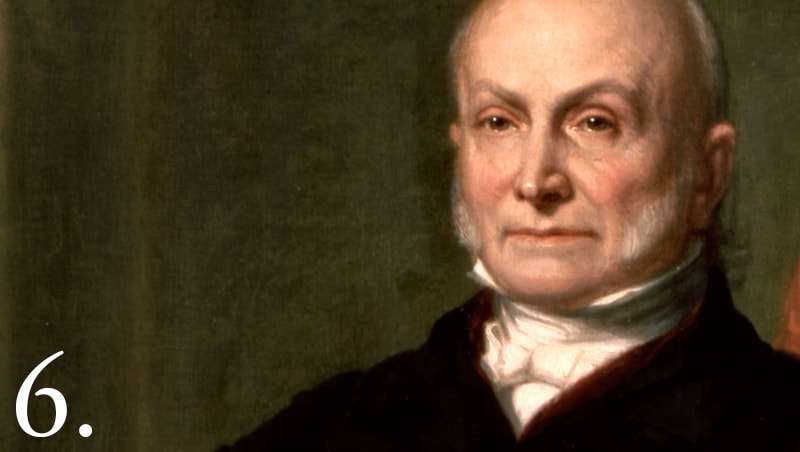The Volokh Conspiracy
Mostly law professors | Sometimes contrarian | Often libertarian | Always independent
John Quincy Adams on lawyers' not focusing on their key arguments

Here's a passage I like from then-Sen. John Quincy Adams's "Lectures on Rhetoric and Oratory: Delivered to the Classes of Senior and Junior Sophisters in Harvard University." He was writing about oral arguments - which used to be much longer then - but I think that most of it also applies to written argument.
But of all the forms of public oratory that, which is the most liable to the excesses of digression, and which requires the severest curb to repress them, is that of the bar. … [The] tendency to impertinent digression … has been the common disgrace of lawyers wherever and whenever there has existed law to disgrace …. [I] entreat you to trace the sources, whence this propensity to wordy flatulence most commonly proceeds. …
The first of the causes, which has made the sounding emptiness of the bar so proverbial throughout the world, is indolence; the want of that industry, which is necessary for a lawyer to probe to the bottom the cause, upon which he is to speak.
When he is not thoroughly acquainted with the real strength and weakness of his cause, he knows not where to choose the most impressive argument. When the mark is shrouded in obscurity, the only substitute for accuracy in the aim is in the multitude of the shafts. You have not weighed in impartial scales the arguments, which offer themselves to your own mind.
Your natural resort is to take them all; and to scatter the two bushels of chaff for fear of losing the two grains of wheat. You content yourself with the reflection, that different minds see the same object with different views; that the judge might think important that, which you might reject as weak; that an omission may always be fatal; that redundancy, though tedious, is safe; and, instead of selecting with discernment, your only care is to accumulate with profusion.
This disposition is further promoted by an inconsiderate deference to the prejudices and passions of the client. The cause of every suitor is important to himself. … Ready as the generality of mankind are to deride the loquaciousness of lawyers, individually they are the first to instigate the vice, which they are most prone in common to censure; and many a client fancies his counsel has not said enough in his behalf, when, in the opinion of every other human being, he would only be chargeable with having said too much.
Still stronger is the temptation to this unmeaning exuberance of words from the professional success and reputation, which it is often found to acquire…. The art of speaking for hours together without intermission is itself no common endowment, and it will ensure a certain grade of professional profit and reputation; as where there is no stamp of sovereign authority upon the coin, a gilt medallion may obtain a circulation equal to that of sterling gold.
Add to this the rivalship of professional competition, and the contagion of mutual example. When the advocate on one side has spent three hours in darkening a cause, which ten minutes might have unfolded in all its light, his opponent feels as if his reputation were at stake.
In the lowest deep, his ingenuity must find a deep still lower. He must not only refute his adversary's arguments, but he must provide for an equal consumption of time. …
Last of all among the causes, which stimulate to vain discourse, is the vanity of the speaker. However tiresome to others, the most indefatigable orator is never tedious to himself. The sound of his own voice never loses its harmony to his own ear; and among the delusions, which self-love is ever assiduous in attempting to pass upon virtue, he fancies himself to be sounding the sweetest tones of justice, when he is only listening to the music of his own vain tongue.
I came across it because it has a translation of Martial's poem, "What about my goats?" It also turns out to be connected to the appellate brief word limit debate. As it happens, I'm tentatively inclined to support keeping the word limits at their current levels, but Adams's view on this general subject (and more besides) struck me as worth airing.
UPDATE: Note that amusing as "wordy flatulence" may be today, back then it seems to have meant "Inflated or puffed-up condition, windiness, vanity; pomposity, pretentiousness" (I quote the Oxford English Dictionary here). The digestive tract meaning, which has in recent years largely driven out the earlier meaning, is only dated back to 1858 by the OED. (The OED also lists another meaning, "The condition of being charged with gas" - and not just intestinal gas - and cited an 1816 play by Richard Brinsley Sheridan, in which a character condemns teetotalers thus: "instead of the social spirit of raillery that used to mantle over a glass of bright Burgundy, their conversation is become like the Spa water they drink, which has all the pertness and flatulence of Champaigne, without the spirit or flavour.")


Show Comments (0)